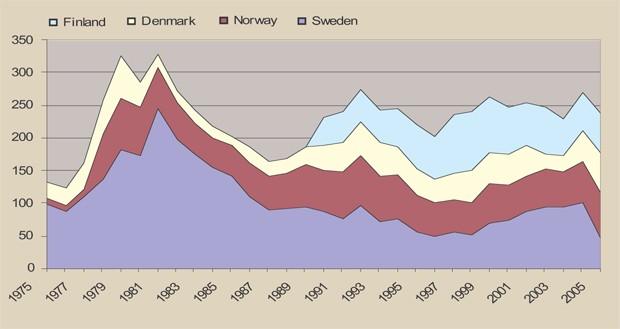The challenge for energy research is thus to reconcile these conflicting pressures and to seek to address:
• The security and diversity of energy supply
• Global climate change and environmental degradation
• Economic competitiveness, and
• Social benefit
A new energy era?
In January 2007 the European Commission published a new energy strategy for Europe1. The aim of the strategy is to balance sustainable development with energy security and economic competitiveness. In the strategy the Commission lists several reasons for adopting a renewed focus on energy-related issues. Among the most significant are: changes in the demand for energy, import-dependency, rising prices for oil and gas, and the imminent global climate crisis. The proposed ten point action plan includes among other things reference to well-functioning energy markets, a better EU emissions trading scheme, energy efficiency, increased use of renewable energy and a strategic energy technology plan.
In terms of political rhetoric the document is in line with other policy statements documenting the emergence of a new energy era. The cost of doing nothing in response to the global climate crisis was recently outlined by both the Stern Review2 and the most recent IPCC report3.
It is not only in the EU that this so-called 'new era' has taken hold. We see movement in the USA as well. Although much of the proposed legislation seems weak, the US Congress is now trying to tackle the environmental and economic challenges ahead. Prospective legislation focuses on some of the most crucial elements in relation to energy provision: the role of nuclear energy, clean coal and alternative fuels, the emissions trading programme and the depth of the US commitment to reducing greenhouse gas emissions4.
Current trends in energy research
Naturally, our primary focus is on developments in the Nordic countries. The oil crisis that occurred during the 1970s served to kick-start energy research throughout the world. However, since the beginning of the 1980s, spending on energy R&D has declined.
The drastic reductions in government spending on energy-related R&D in the Nordic countries are in large part due to reduced spending on nuclear research; e.g., Denmark and Sweden together reduced their spending on nuclear R&D by over 80% from 1975 to 2005.
Today more than 90% of total energy research spending in the Nordic countries is undertaken in non-nuclear energy areas. In total the Nordic countries (excluding Iceland) spent approximately 212 mill. euros on non-nuclear energy research in 2005, of which spending on renewable energy research accounts for 30% of that total.
During the last 2-3 years Denmark and Norway in particular have increased their energy R&D investments to "historically" high levels with a new focus on hydrogen and fuel cells. Sweden saw a drastic cut in its energy R&D spending in 2005, but for 2006 spending was again increased to what is now a near
historically high level.
Nordic Energy Research has over the last 20 years funded energy research in the Nordic countries and with a Nordic Perspective. Our current strategy focuses on five main areas of research:
• Energy efficiency
• Renewable energy technologies
• Hydrogen and fuel cell technologies
• Energy markets, and
• Impacts of climate change on energy systems
Nordic funds are however limited – approximately 3.4 mill. euros per year – while demand surpasses the funds available. In the last call for research proposals in 2006, 115 expressions of interest asked for more than 100 mill. euros. In the end 16 new projects received 10 mill. euros over the next 4 years.
The future of energy: A 2025 perspective
No matter how we view current global geopolitical trends it appears highly unlikely that the energy sector will not continue to dominate political and economic and developments over the next 20 years. Global warming and the demise of the petroleum era could make the quest for new sustainable energy solutions the new 'moon project' of our century. The Nordic energy research communities are well positioned to create and diffuse new knowledge on such energy solutions, especially if they are supported by an ambitious Nordic strategic energy technology plan backed by a sufficient level of public and private funding.
By Birte Holst Jørgensen, Managing Director of Nordic Energy Research, and Amund Vik, Project Assistant, Nordic Energy Research

Nordic Energy Research
Since 1985, Nordic Energy Research has supported energy research and innovation in the Nordic countries.
Its funds come from national energy organisations of the five countries, including the Danish Energy Authority (DK), TEKES – Finnish Funding Agency for Technology and Innovation (FI), Orkustofnun – National Energy Authority (IS), Norwegian Ministry of Petroleum and Energy (NO) and the Swedish Energy Agency (SE).
Website: www.nordicenergy.net